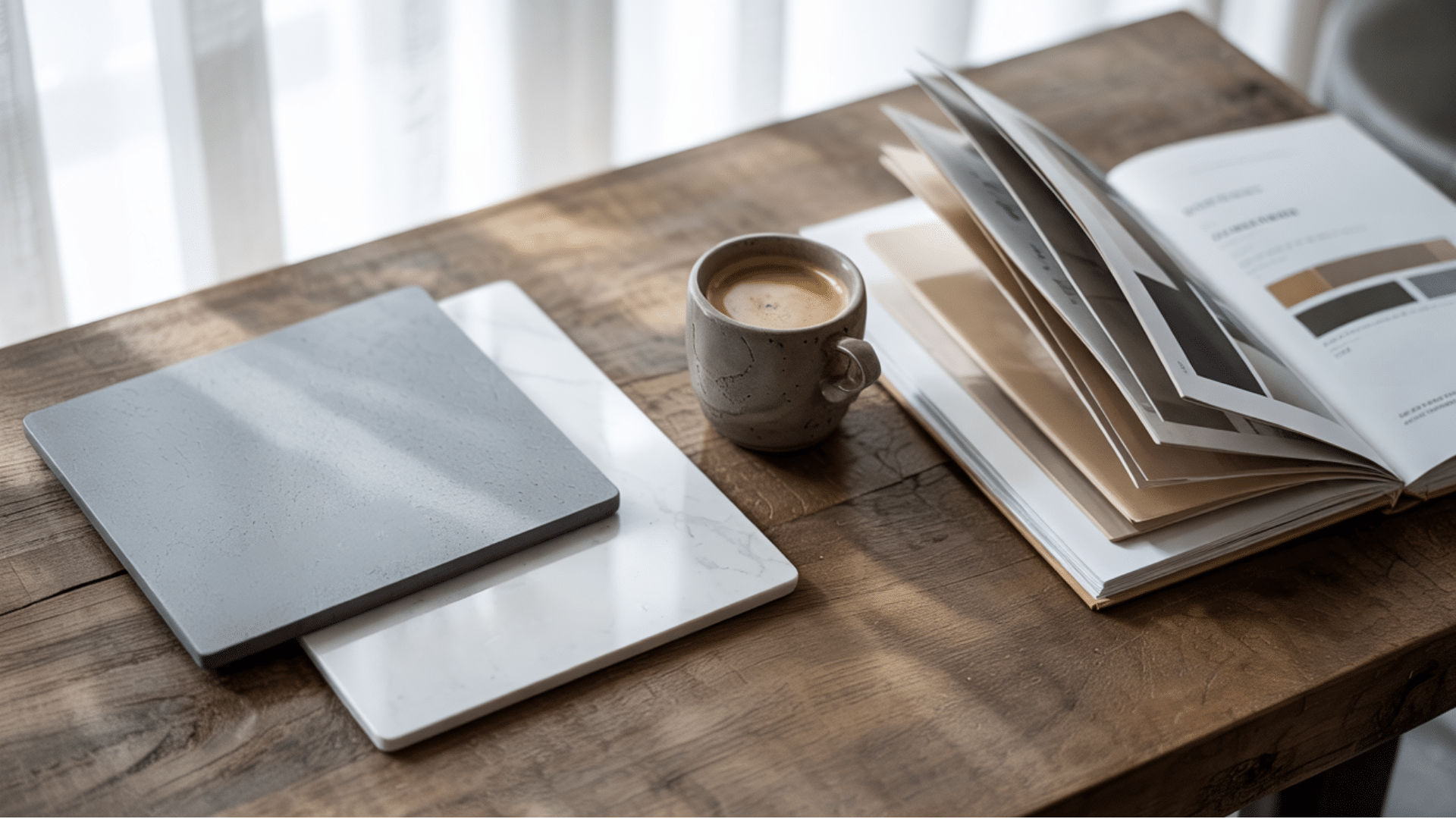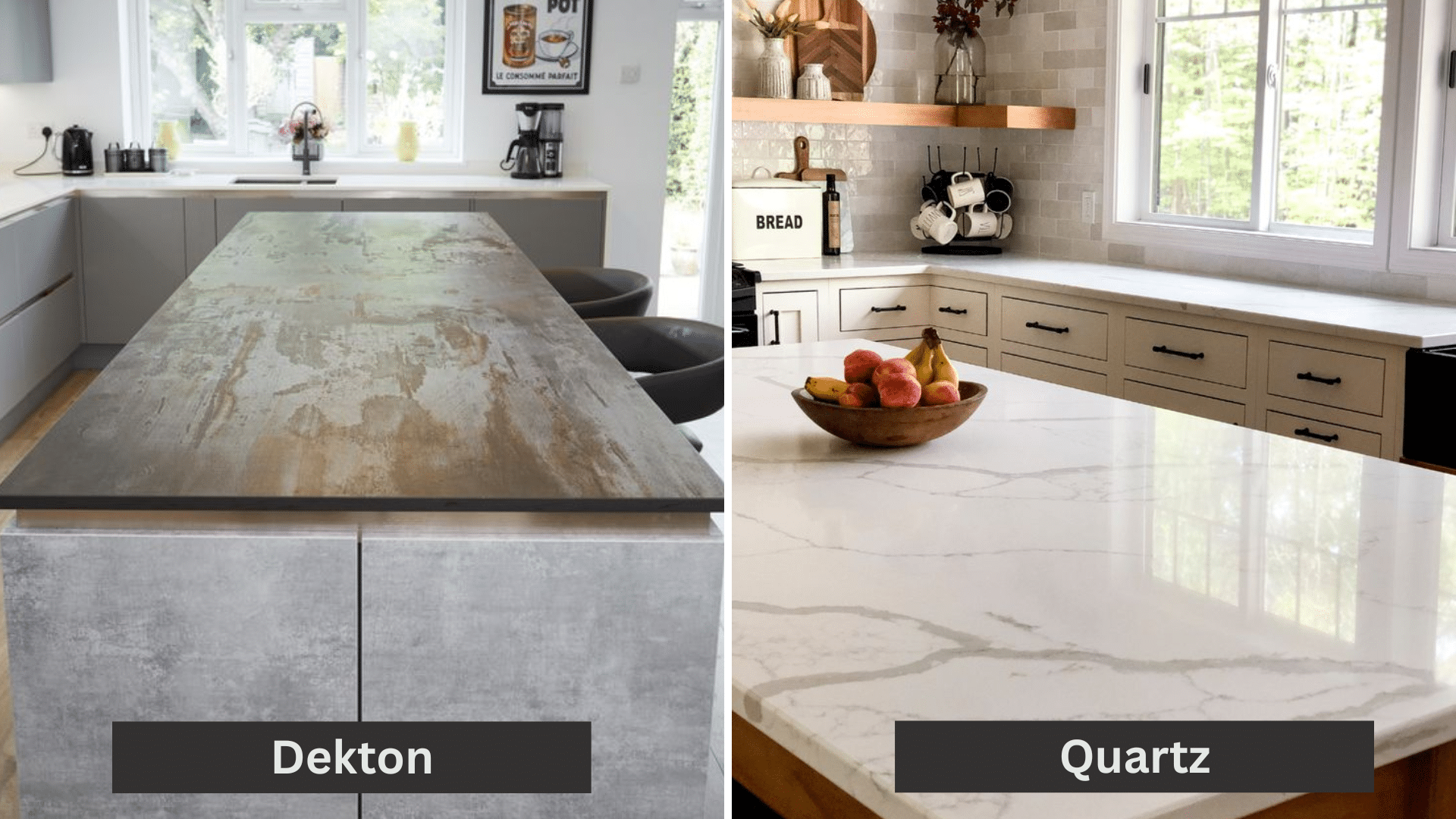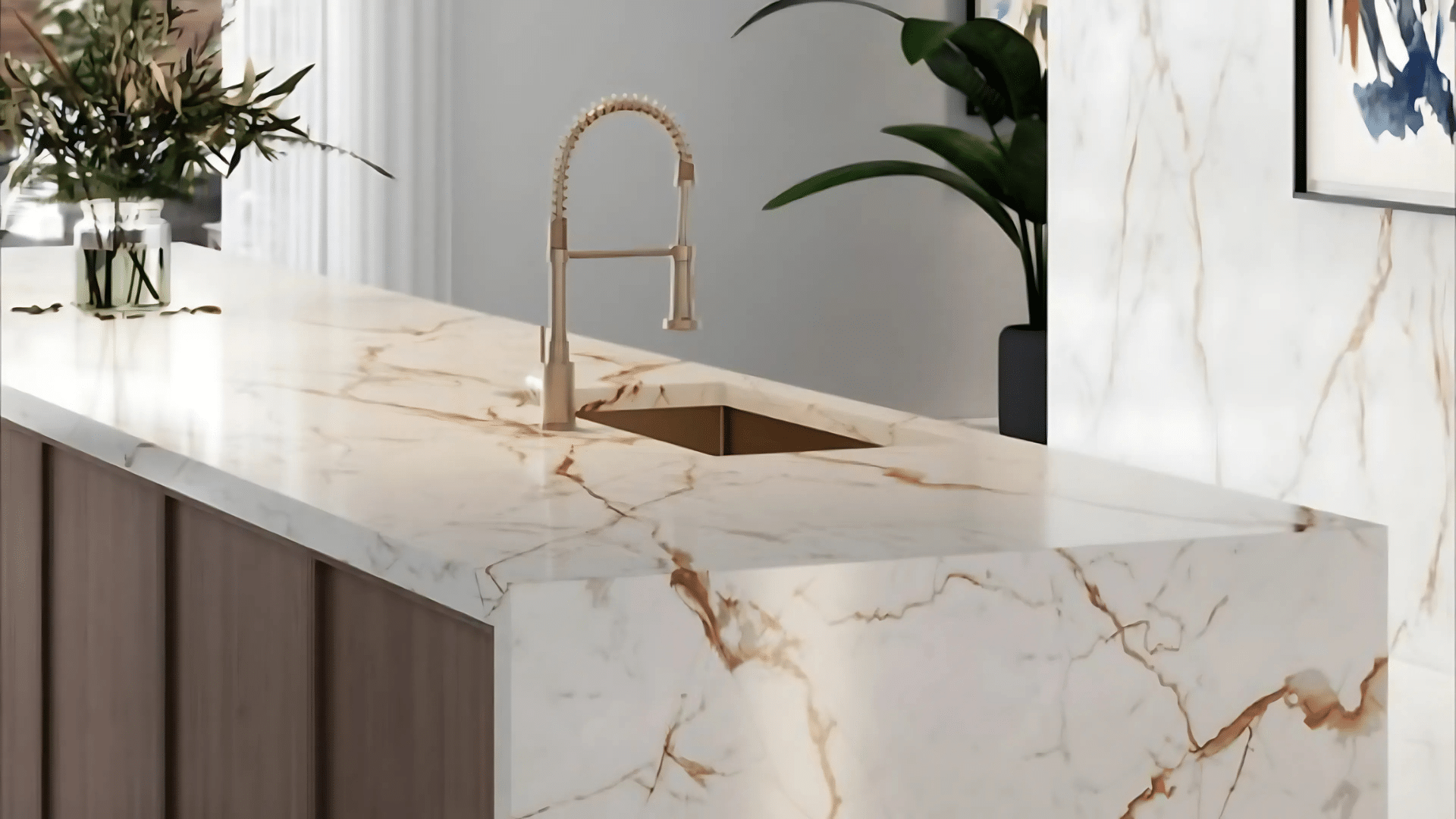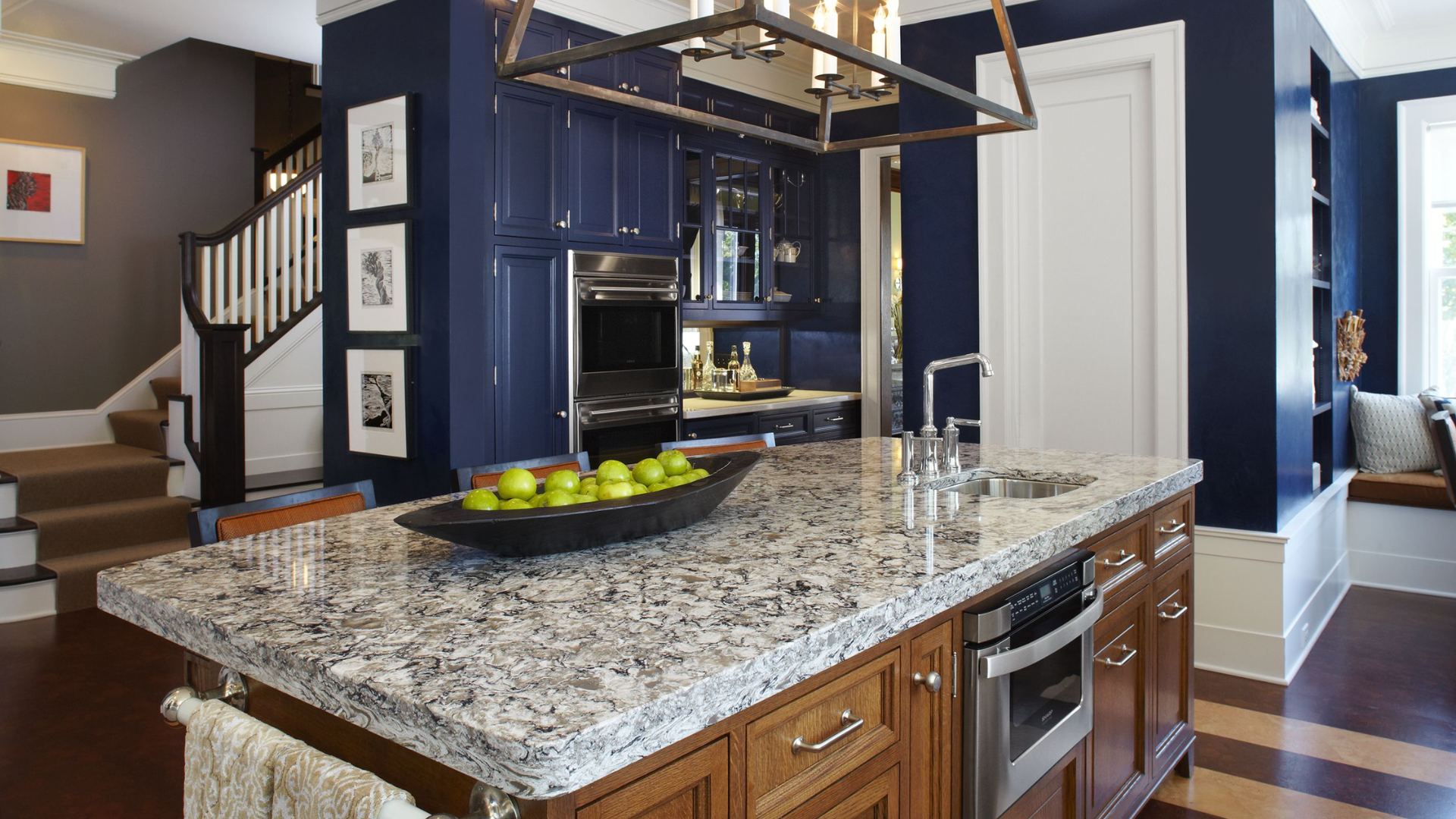Kitchen worktop choices got you stuck between Dekton and quartz? You’re not alone! Ever stood in your kitchen stroking different samples, wondering which one will still look good after months of use?
When you’re investing in a space where dinner parties and everyday messes happen, your worktop choice matters.
Both offer the perfect mix of “wow” factor and “well, that cleaned up easily!” but in different ways.
Let’s cut through the confusion and examine what each of these worktop choices sells, helping you decide which surface will truly shine in your space, providing both the style you crave and the durability you need.
What Are Dekton and Quartz Worktops?
Before starting the clock on the judgment, let’s get to know our contestants first. Both worktop options are made of engineered stone, but they perform quite differently in real homes.
Dekton, the newer player, is made through a process called sinterization, which fuses glass, quartz, and porcelain under extreme heat and pressure. This creates an ultra-compact surface with some unique traits and an ultra-durable slab.
Quartzworktops are made of crushed natural quartz (about 90-95%) mixed with resins and color pigments. This blend creates a tough, non-porous surface that’s been a kitchen favorite for years. It offers strength with a wide range of colors.
Now we can get into what makes these materials tick so that you can match the right worktop to your cooking style and home life.
Dekton vs Quartz: Key Differences That Matter

These two premium surfaces may look similar at first glance, but they’re built differently from the ground up. Let’s see how they stack up in the features that matter most for daily life in a busy kitchen.
|
Feature |
Dekton |
Quartz |
|
Heat Resistance |
Extremely high. Hot pots and pans can be placed on the surface without damage. Ideal for serious home cooks. |
Moderate. Prolonged heat or direct contact with hot cookware can cause discoloration or damage. Use trivets or hot pads. |
|
UV Resistance |
UV-resistant and maintains color in sunlight. |
Not UV-resistant. Exposure to direct sunlight may cause discoloration over time. |
|
Scratch Resistance |
Due to its hardness, it is highly scratch-resistant. |
It has good scratch resistance but is slightly softer than Dekton. |
|
Chip Resistance |
Harder, but more brittle—especially on corners and edges. May chip if dropped or hit forcefully. |
Slightly more flexible. Edges are more impact-resistant, making it better suited for daily use. |
|
Stain Resistance & Porosity |
Non-porous and ultra-stain-resistant. Withstands acids, oils, and wines without reacting. Great for heavy kitchen use. |
Also non-porous, but resins can react to harsh chemicals. Best to use mild cleaners. Handles most kitchen messes easily. |
|
Cleaning & Maintenance |
Low-maintenance. Wipe with soap and water. Resistant to chemicals and does not need sealing or special treatment. |
Low-maintenance. Wipe with soap and water. Avoid strong chemicals. Also doesn’t require sealing. |
Dekton Versus Quartz: Side-by-Side Comparison

Just knowing the qualities is not enough for an informed decision. Let’s see how these qualities translate to real-life use in your home, from busy kitchens to spa-like bathrooms.
| Feature | Dekton | Quartz |
|---|---|---|
| Kitchen Performance | Ideal for serious cooks; handles hot pans and heavy use with ease | Great for family kitchens; suitable for daily use with some heat resistance |
| Bathroom Use | Best for modern, minimalist designs | Offers a warmer, cozier aesthetic |
| Moisture Resistance | Water-resistant and mold-proof | Water-resistant and mold-proof |
| Outdoor Capability | Suitable for outdoor use; UV, weather, and fade resistant | Indoor use only; may fade or get damaged in sunlight |
Cost Analysis of Dekton vs Quartz: Understanding Your Countertop Investment
While your worktop choice should never be based on price alone, budget realities do matter. These facts help you weigh the financial side against the features you truly need when comparing dekton vs quartz materials.
Making sense of your investment:
- Initial Cost: Dekton has a higher price point, reflecting complex manufacturing and special cutting tools, while Quartz has a more budget-friendly, good value while maintaining the high-end look. The quartz price typically ranges from moderate to premium depending on the pattern.
- Installation Needs: Dekton requires specialists who understand the material and have proper dekton blades, which can crack if not handled properly, while Quartz is easier to work with – more contractors have experience with installation.
- Where to Find It: Quartz slabs are widely available, carried by most home improvement stores and many brands. While Dekton worktops can be more exclusive, typically found in specialty showrooms
- Long-Term Value: Both options provide excellent durability, maintaining their look and function for many years. But Dekton countertops may have a slight edge in extreme conditions. It is better for very active kitchens.
Appearance & Visual Appeal
The look of your countertop sets the tone for your entire kitchen. While both options offer beauty, they speak different design languages.
Dekton Appearance

Dekton brings a more modern, industrial vibe to kitchens. Its smooth, matte finish creates a sleek, clean look that many designers love.
The ultra-compact surface has a cleaner, more uniform appearance than quartz, making it perfect for minimalist or contemporary spaces.
Dekton colors range from concrete-inspired grays to rusty browns and pure whites. Some styles mimic natural stone, but most embrace their man-made nature.
The large slabs create fewer seams, making your kitchen look more put-together. Edge styles tend to be straight and crisp for a bold statement.
Traditional Quartz Appearance

Quartz brings nature indoors with its stone-like appeal. The tiny crystal bits catch light in a way that adds depth and life to your kitchen.
Most quartz has a speckled or flecked look that feels warm and lived-in. Many people love how it mimics marble or granite, but with better durability.
The color range runs from bright whites to deep blacks, with plenty of creams and grays in between. Some even come with bold blue or green tones for a pop of color.
Edge options tend to be smooth and rounded, giving a friendly, approachable feel to your space.
Design & Styling Options
Your kitchen style is as personal as your cooking. Both countertops offer distinct design possibilities that can transform your space in very different ways.
Dekton Design Styles
Dekton steps boldly into the future with cutting-edge looks that push design boundaries. It’s the choice for homeowners who want something distinctly current or ahead of trends. These dekton materials offer unique possibilities.
- Large-Format Industrial: Dekton excels with concrete, metal, and stone looks that feel more raw and industrial. The “Industrial Collection” offers rust effects and weathered finishes.
- Ultra-Thin Profiles: Due to its strength, Dekton can be manufactured in thinner slabs (just 8mm thick), providing a light, floating appearance that’s difficult to achieve with other materials.
- Matte Textures: Dekton’s natural finish tends to be more matte, which is perfect for modern or Scandinavian-style kitchens where glossy surfaces feel out of place.
- Book-Matched Patterns: Some Dekton styles feature book-matched patterns where the veining forms mirror images across the slab, ideal for dramatic kitchen islands or backsplashes.
- Wood Look: Surprisingly, some Dekton collections mimic the look of wood planks while offering all the durability of stone, perfect for bringing warmth to modern kitchens.
Quartz Design Styles
When you choose traditional quartz, you’re getting a time-tested material that bridges traditional and contemporary styles. Its versatility shines in homes from classic farmhouse to sleek modern.
- Classic Marble Look: Quartz really shines with its marble-inspired designs. Options like “Calacatta” and “Carrara” styles give you the white-with-gray-veining of Italian marble without the upkeep.
- Subtle Flecked Patterns: Many quartz options feature tiny speckles or salt-and-pepper patterns, perfect for homes with a timeless appeal. These patterns hide crumbs and water spots better than solid colors.
- Concrete Industrial: For urban loft styles, concrete-look quartz gives you that raw, industrial feel without the porosity issues of real concrete.
- Waterfall Edges: A quartz countertop is ideal for popular waterfall edges where the material continues down the sides of islands, creating a seamless, flowing look.
- Solid Colors: From pure whites to midnight blacks, quartz comes in solid colors that work beautifully in modern kitchens where clean lines matter most.
Final Decision: Which Worktop Works for You
Both Dekton and quartz make great kitchen worktops, but each suits different needs.
Quartz wins the popularity contest and for good reason – it offers excellent looks, good durability, and better value for most homes. It’s the top pick for families who want a balance of style, function, and cost.
Dekton is the specialist’s choice, perfect if you’re serious about cooking, need extreme durability, or want an outdoor kitchen. Its heat and UV resistance make it worth the extra cost for those specific needs.
Think about how you use your kitchen, what looks make you smile, and which features matter most. The right choice is the one that fits both your style and your daily life.
Did this guide help you decide between dekton vs quartz? Drop a comment below letting us know which one you picked and why!
Frequently Asked Questions
Can I Cut Directly on Dekton or Quartz Surfaces?
While both are scratch-resistant, always use cutting boards. Direct knife use will dull your knives faster than it damages the worktop.
How Long Do Worktops Typically Last?
With proper care, both can last 20+ years. Their longevity makes them good investments despite the upfront cost.
Can I Install Worktops Myself?
Quartz might be DIY-possible for skilled homeowners, but Dekton needs professional installation. The cost of mistakes far outweighs installation fees.


